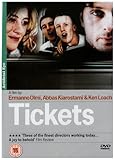Eye For Film >> Movies >> Tickets (2005) Film Review
Every so often, established directors like to collaborate - compete - with each other in what is the cinematic equivalent of free styling. So it is that in films as varied as Aria (1987), Two Evil Eyes (1990), New York Stories (1989) and 11'09'01-September 11 (2002), different episodes have been contributed by different directors, with only an arbitrarily chosen linking theme to lend something like unity to the overall film.
It is difficult to know exactly how many multi-ethnic co-directors are enough to make light work of a film without spoiling the broth, but following the example set by other recent projects (Three, Three Extremes, Eros) where three world-renowned filmmakers have come together, Tickets also opts for the same number - Italy's Ermanno Olmi, Iran's Abbas Kiarostami, and England's Ken Loach. The trans-European train on which the film's sections unfold is the perfect setting for such a synergistic venture, for trains tend to be chaotic places where strangers meet, different nationalities sit side-by-side and everyone, no matter what the class of their ticket, is traveling in the same direction.

The first story by Olmi concerns a pharmacologist (Carlo Delle Piane) on his way to his grandson's birthday party in Rome. In a noisy dining carriage, the old man reminisces about his own boyhood, drifts in and out of a romantic reverie about the young PR (Valeria Bruni Tedeschi) who kindly helped him get his ticket and contemplates his own approaching deterioration and death, before finally performing a simple act of kindness for some Albanian travelers. This is certainly the most substantial and subtle of the film's three episodes, but it is also strangely the least engaging, with a pace that recalls the endless delays of British Rail rather than the more efficient services on the continent.
The middle section, written and directed by Kiarostami, picks up Olmi's theme of nostalgia for youth, while focusing upon a man still young enough to pick up again what he has left behind. Assigned as part of his National Service to escort an imperious harridan (Silvana De Santis) on a visit to the grave of her ex-military husband, 25-year-old Filippo (Filippo Trojano) runs into a girl from his hometown. Hearing news of a former girlfriend, whom he had long forgotten, Filippo decides to ditch his nagging middle-aged companion and pursue the cause of young love. With a hilariously tense vignette at its core, in which the belligerent woman curtly fends off a male passenger's accusations that she has stolen his mobile phone, the whole piece is wryly observed and finely nuanced, and, like its principal characters, wins itself the best spot on the train, despite having only second-class tickets.
The last episode, directed by Loach and written by his regular collaborator Paul Laverty, brings together the Albanian family from Olmi's episode and the motif of stealing from Kiarostami's to create an exploration of the relationship between tribalism and humanism. En route to Rome to watch their beloved Celtic play in a Champions League match, three young Glaswegian supermarket workers (Martin Compston, William Ruane, Gary Maitland) befriend an Albanian boy (Klajdi Qorraj) wearing a Manchester United tee shirt. When they discover that one of their tickets has gone missing, they confront the boy and his family and realise that their allegiance to a home team involves a responsibility to broader communities.
Only Loach could take a group of British football supporters, normally associated abroad with insular hooliganism, and turn them into sensitive ambassadors of multiculturalism. His unquestioning insistence upon the decency and heroism of his proletarian protagonists might ring a little false to anyone who has ever been forced to share a carriage with the sectarian fans of the "beautiful game". Still, like a goal scored in the dying minutes, Loach's episode brings Tickets to a crowd pleasing, triumphalist finale.
Reviewed on: 01 Dec 2005


















